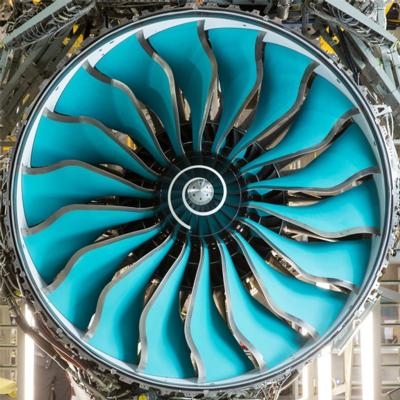Sun, Mar 02, 2014
Looks To Build On The Success Of The Trent Family
Rolls-Royce has shared details of its next generation of engine designs, which could be ready within ten years, featuring technology innovation designed to transform performance. The company has built a technology leadership position with its Trent family of engines, the latest of which, the Trent XWB, the company says is the most efficient engine flying today. Trent engines will continue in service for decades to come with 2,500 in service and more than 2,500 on order.

Rolls-Royce is continually innovating and, as part of that ongoing process, is looking to build on the success of the Trent family of engines with two new generation engine designs.
The first design, Advance, will offer at least 20 per cent better fuel burn and CO2 emissions than the first generation of Trent engine and could be ready from the end of this decade.
The second, UltraFan, a geared design with a variable pitch fan system, is based on technology that could be ready for service from 2025 and will offer at least 25 per cent improvement in fuel burn and emissions against the same baseline.
"These new designs are the result of implementing our ongoing technology programs," said Colin Smith, Rolls-Royce Director - Engineering and Technology. "They are designed to deliver what our airframe and airline customers tell us they need: even better fuel efficiency, reliability and environmental performance."
Both engine designs are the result of the ongoing research and development investment, of approximately £1 billion (approx. $1.67 billion) a year, which Rolls-Royce makes across its aerospace and non-aerospace businesses.
The designs will feature architecture and technology improvements, all currently at an advanced stage of development, that include:
- A new engine core architecture - to deliver maximum fuel burn efficiency and low emissions.
- A CTi Fan System - carbon/titanium fan blades and a composite casing that reduce weight by up to 1,500lb per aircraft, the equivalent of carrying seven more passengers at no cost
- Advanced ceramic matrix composites - heat resistant components that operate more effectively in high turbine temperatures.
- A geared design, called UltraFan, which will deliver efficient power for high-thrust, high-bypass ratio engines of the future.
(Image provided by Rolls-Royce)
More News
Cooperative Surveillance Any surveillance system, such as secondary surveillance radar (SSR), wide-area multilateration (WAM), or ADS-B, that is dependent upon the presence of cert>[...]
Aero Linx: OX5 Aviation Pioneers Incorporated in 1955 as a Pa 501 (c)(3) Not for Profit Corporation, the OX5 Aviation Pioneers is dedicated to bringing before the public the accomp>[...]
The Pilot Appeared To Regain Control After Six Rotations And Attempted To “Fly Out” Inverted But Had Insufficient Altitude On November 8, 2025, at 1038 eastern standard>[...]
From 2018 (YouTube Edition): Aero-News Talks With The Airplane's Builder One of the many unique airplanes at AirVenture 2018 was a 1/3-scale B-17 bomber built by Jack Bally, who ta>[...]
Aero Linx: Society of U.S. Army Flight Surgeons (SoUSAFS) The Society of US Army Flight Surgeons (SoUSAFS) serves to advance the science and art of Aerospace Medicine and its allie>[...]
 ANN's Daily Aero-Term (12.04.25): Cooperative Surveillance
ANN's Daily Aero-Term (12.04.25): Cooperative Surveillance ANN's Daily Aero-Linx (12.04.25)
ANN's Daily Aero-Linx (12.04.25) NTSB Prelim: Extra Flugzeugproduktions EA 300/SC
NTSB Prelim: Extra Flugzeugproduktions EA 300/SC Classic Aero-TV: The Bally Bomber - The All Time Ultimate Warbird Replica?
Classic Aero-TV: The Bally Bomber - The All Time Ultimate Warbird Replica? ANN's Daily Aero-Linx (12.05.25)
ANN's Daily Aero-Linx (12.05.25)



